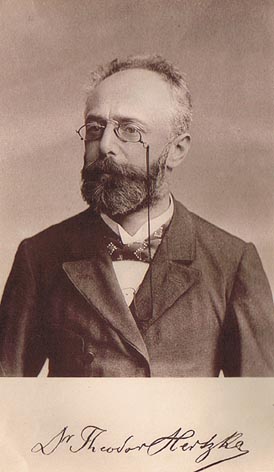Related Research Articles

Edward Bellamy was an American author, journalist, and political activist most famous for his utopian novel Looking Backward. Bellamy's vision of a harmonious future world inspired the formation of numerous "Nationalist Clubs" dedicated to the propagation of his political ideas.

A utopia typically describes an imagined community or society that possesses highly desirable or near-perfect qualities for its members. It was coined by Sir Thomas More for his 1516 book Utopia, which describes a fictional island society in the New World.

Looking Backward: 2000–1887 is a utopian time travel science fiction novel by the American journalist and writer Edward Bellamy first published in 1888.

News from Nowhere is an 1890 classic work combining utopian socialism and soft science fiction written by the artist, designer and socialist pioneer William Morris. It was first published in serial form in the Commonweal journal beginning on 11 January 1890.

Theodor Hertzka, or Hertzka Tivadar was a Jewish-Hungarian-Austrian economist and journalist.

Three Hundred Years Hence is a utopian science fiction novel by author Mary Griffith, published in 1836. It is the first known utopian novel written by an American woman. The novel was originally published in 1836 as part of Griffith's collection, Camperdown, or News from Our Neighborhood, and later published by Prime Press in 1950 in an edition of 300 copies.

Equality is a utopian novel by Edward Bellamy, and the sequel to Looking Backward: 2000–1887. It was first published in 1897. The book contains a minimal amount of plot; Bellamy primarily used Equality to expand on the theories he first explored in Looking Backward.

The Republic of the Future: or, Socialism a Reality is a novella by the American writer Anna Bowman Dodd, first published in 1887. The book is a dystopia written in response to the utopian literature that was a dramatic and noteworthy feature of the second half of the nineteenth century.

Caesar's Column: A Story of the Twentieth Century is a novel by Ignatius Donnelly, famous as the author of Atlantis: The Antediluvian World (1882). Caesar's Column was published pseudonymously in 1890. The book has been variously categorized as science fiction, speculative fiction, dystopian fiction, and/or apocalyptic fiction; one critic has termed it an "Apocalyptic Utopia."

New Amazonia: A Foretaste of the Future is a feminist utopian novel, written by Elizabeth Burgoyne Corbett and first published in 1889. It was one element in the wave of utopian and dystopian literature that marked the later nineteenth and early twentieth centuries.

The Diothas; or, A Far Look Ahead is a 1883 utopian novel written by John Macnie and published using the pseudonym "Ismar Thiusen". The Diothas has been called "perhaps the second most important American nineteenth-century ideal society" after Edward Bellamy's Looking Backward (1888).

For the silent film see The Great Romance (film)
The Milltillionaire, or Age of Bardization is a work of utopian fiction written by Albert Waldo Howard, and published under the pseudonym "M. Auberré Hovorré." The book was one element in the major wave of utopian and dystopian literature that characterized the final decades of the nineteenth century.

Arena Publishing Company was an American book and magazine publishing firm of the late 19th century, founded by author and editor B. O. Flower.
Young West: A Sequel to Edward Bellamy's Celebrated Novel "Looking Backward" is an 1894 utopian novel, written by Solomon Schindler, radical rabbi of Boston. As its subtitle indicates, the book was one of the many responses and sequels to Edward Bellamy's famous 1888 novel Looking Backward, and was one volume in the major wave of utopian and dystopian writing that distinguished the later nineteenth century.

Moving the Mountain is a feminist utopian novel written by Charlotte Perkins Gilman. It was published serially in Perkins Gilman's periodical The Forerunner and then in book form, both in 1911. The book was one element in the major wave of utopian and dystopian literature that marked the later nineteenth and early twentieth centuries. The novel was also the first volume in Gilman's utopian trilogy; it was followed by the famous Herland (1915) and its sequel, With Her in Ourland (1916).

Nationalist Clubs were an organized network of socialist political groups which emerged at the end of the 1880s in the United States of America in an effort to make real the ideas advanced by Edward Bellamy in his utopian novel Looking Backward. At least 165 Nationalist Clubs were formed by so-called "Bellamyites," who sought to remake the economy and society through the nationalization of industry. One of the last issues of The Nationalist noted that "over 500" had been formed. Owing to the growth of the Populist movement and the financial and physical difficulties suffered by Bellamy, the Bellamyite Nationalist Clubs began to dissipate in 1892, lost their national magazine in 1894, and vanished from the scene entirely circa 1896.

Utopian socialism is the term often used to describe the first current of modern socialism and socialist thought as exemplified by the work of Henri de Saint-Simon, Charles Fourier, Étienne Cabet, and Robert Owen. Utopian socialism is often described as the presentation of visions and outlines for imaginary or futuristic ideal societies, with positive ideals being the main reason for moving society in such a direction. Later socialists and critics of utopian socialism viewed utopian socialism as not being grounded in actual material conditions of existing society. These visions of ideal societies competed with revolutionary and social democratic movements.

The New Nation was a weekly newspaper launched in Boston, Massachusetts in January 1891 by the American socialist writer Edward Bellamy. The paper served as a de facto national organ of the nationwide network of Nationalist Clubs and expounded upon their activities and political ideas, which derived from the best-selling 1888 novel Looking Backward.
References
- ↑ Kenneth M. Roemer, The Obsolete Necessity: America in Utopian Writings, 1888–1900, Kent, OH, Kent State University Press, 1976; pp. 186–207.
- ↑ Richard Toby Widdicombe, Edward Bellamy: An Annotated Bibliography of Secondary Criticism, New York, Garland, 1988.
- ↑ Lyman Tower Sargent, British and American Utopian Literature, 1516–1975: An Annotated Bibliography, Boston, G. K. Hall, 1979.
- ↑ G. Claeys Late Victorian Utopias: A Prospective, (Pickering and Chatto, London, 2008), J. Pfaelzer, The Utopian Novel in America 1886–1896: The Politics of Form, (University of Pittsburgh Press, Pittsburgh, 1984), K. Roemer, The Obsolete Necessity: America in Utopian Writings, 1888–1900, (Kent State University Press, Kent, 1976), K. Roemer, Utopian Audiences, How Readers Locate Nowhere, (University of Massachusetts Press, Amherst, 2003), C.J. Rooney, Dreams and Visions: a study of American utopias, 1865–1917 (1997), F. Shor, Utopianism and radicalism in a reforming America, 1888–1918, (Greenwood Press, Westport Connecticut, 1997), and especially L.T. Sargent British and American Utopian Literature, 1516–1985: An Annotated, Chronological Bibliography (Garland Publishing, New York, 1988).
- ↑ Fabi, Maria Giulia (January 1, 2001). Passing and the Rise of the African American Novel . University of Illinois Press. p. 50. ISBN 9780252026676.
griggs imperium looking backward.